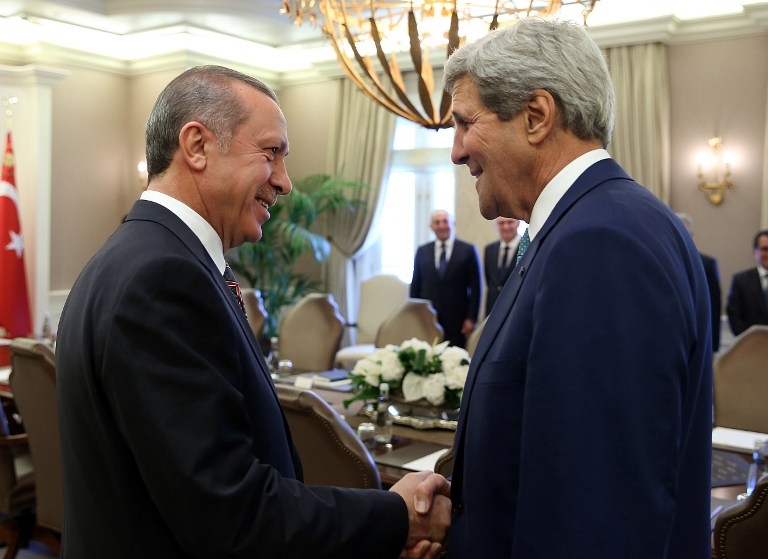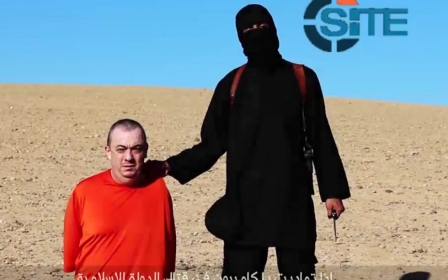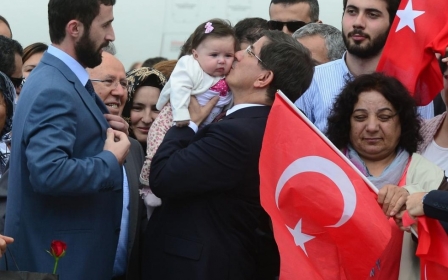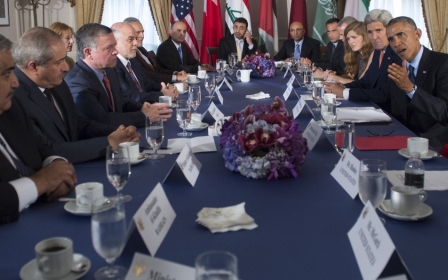Turkey appears to enter the Syria fray

As the US-led coalition airstrikes against militants continued for the second day in Syria, Turkey took a step forward towards joining the battle, while also appearing to maintain a cautious position.
Airstrikes were reported on the Iraqi-Syria border of Aboukamal on Wednesday, near an area where the US-led campaign began on Tuesday with the support of five Arab countries, Saudi Arabia, Qatar, the United Arab Emirates, Bahrain and Jordan. The UK Parliament is also expected to be recalled on Friday to discuss whether or not the country plans to join the campaign.
Overnight, US air strikes also reportedly struck Kobani, also known as Ayn al-Arab, where 140,000 mostly Kurdish refugees have fled across the border to escape the Islamic State militant group.
On Tuesday from New York, ahead of the UN General Assembly meeting this week, Turkish President Recep Tayyip Erdogan reportedly told journalists that his country was ready to join the coalition to fight the Islamic State militants.
"We will give the neccesary support to the operation," Erdogan has been quoted as saying. "The support could be military or logistics."
Then, after a meeting with Turkish officials in New York on Wednesday, US Secretary of State John Kerry said Turkey was "very much" on board.
“Turkey is very much part of this coalition, and Turkey will be very engaged on the frontlines of this effort,” Kerry told reporters.
Despite Erdogan and Kerry’s public statements, it is still far from clear exactly what this support will entail as Turkey denied that either its airspace or air bases on its territory had been used in the strikes.
Citing the Syrian Observatory for Human Rights, Reuters news agency claimed that aircraft targeting the group near the Syrian-Turkish border had approached from Turkey.
Turkish Prime Minister Ahmet Davutoglu released a statement on Wednesday saying that Incirlik Base in southern Turkey had not been used for the strikes.
Likewise, Erdogan – who expressed doubt about the efficacy of airstrikes to defeat the militant group just 24 hours ago – and other officials have indicated that the country’s support will still require discussion.
“[The US-led coalition] should openly disclose their scenarios about the future of Syria and the al-Assad regime. We’ll evaluate our position only after hearing these scenarios from them,” Deputy Prime Minister Yalcin Akdogan told the Hurriyet Daily News on Tuesday.
MEE contributor and Turkish analyst David Barchard wrote on Wednesday that Turkey is likely to exact two demands for its involvement in the coalition: a firm commitment by the US to bring down Assad’s government and action against the US-based Gulen movement.
“Nevertheless, it seems that the government will definitely equip itself with enabling powers for the potential military involvement,” writes Barchard, noting that Yeni Safak - a daily newspaper close to the government - reported that two permits, which would authorise military action will go before the Grant National Assembly on 2 October for a vote.
Turkey had originally shied away from joining the coalition. Some analysts had suggested that Ankara would become more active once 49 Turkish hostages, held by IS, were released as they were over the weekend.
But even then, Turkey may be hemmed in by a burgeoning Islamic State threat within the country, used as a recruiting ground for the group and a pathway for its fighters headed to Syria and Iraq, analysts said.
Sinan Ulgen, a former Turkish diplomat and President of Istanbul based think-tank EDAM, told MEE contributor Cagri Ozdemir that it is more this internal threat, than the hostages, that has put Turkey in a tight position.
"In other words, Turkey was not pacified because of the hostage situation, but more than that, IS's organisation in Turkey and the latent threat of terrorist attacks makes it difficult for Turkey to adopt drastic measures," Ulgen told MEE.
Middle East Eye propose une couverture et une analyse indépendantes et incomparables du Moyen-Orient, de l’Afrique du Nord et d’autres régions du monde. Pour en savoir plus sur la reprise de ce contenu et les frais qui s’appliquent, veuillez remplir ce formulaire [en anglais]. Pour en savoir plus sur MEE, cliquez ici [en anglais].




